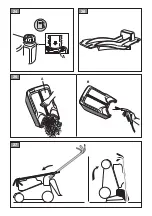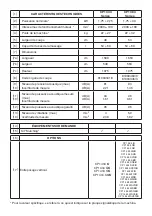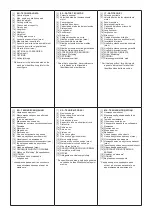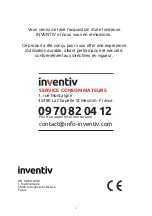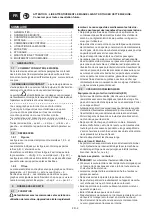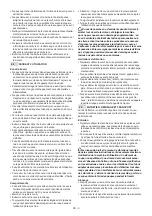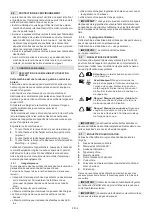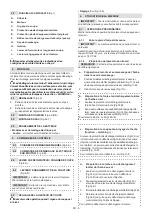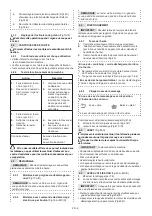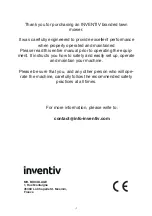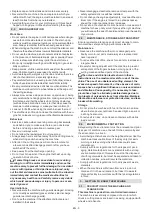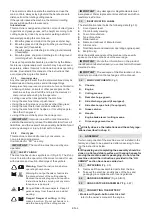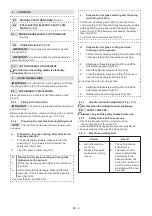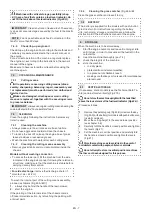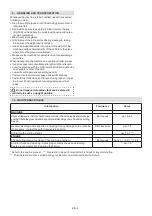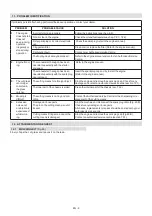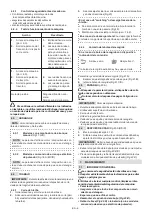
EN - 3
• Replace caps of all fuel tanks and containers securely.
• Never start the machine in the same place in which you
refilleditwithfuel;theenginemustbestartedinanareaat
least 3 metres from where you refuelled.
• Avoid getting any fuel or your clothing and, if this should
happen, change your clothes before starting the engine.
2.3 DURING OPERATION
Work Area
•
Donotoperatetheengineinconfinedspaceswheredanger
-
ous carbon monoxide fumes can collect. The start-up op-
erations must be carried out outdoors or in a well-ventilated
area. Always remember that the exhaust gases are toxic.
• When starting up the machine, do not direct the silencer and
thereforetheexhaustfumestowardsflammablematerials.
• Do not use the machine in environments at risk of explosion,
inthepresenceofflammableliquids,gasorpowder.Power
tools create sparks which may ignite the dust or fumes.
•
Workonlyindaylightorwithgoodartificiallightingoodvisi
-
bility conditions.
• Keep persons, children and animals away from the working
area. Children must be supervised by another adult.
• Avoid working with wet grass, in the rain and when there is a
risk of a thunderstorm, especially lightening.
• Pay careful attention to uneven ground (hills, dips), slopes,
hidden hazards and obstacles that could limit visibility.
• Be very careful near ravines, ditches or embankments. The
machine could overturn if a wheel slides over the edge or if
the earth gives way.
• Always mow across a slope and never up and down it, being
very careful when changing direction, making sure you have
firmfootageandthatthewheelsdonothitanyobstacles
(such as stones, branches, roots, etc.) that may cause the
machine to slide sideways or make you lose control of it.
•
Lookoutfortrafficwhenusingthemachineneartheroad.
•
Toavoidtheriskoffire,donotleavethemachinewiththeen
-
ginehotonleavesordrygrassorotherflammablematerial.
Behaviour
• Exercise caution when reversing or moving backwards.
Look behind you to make sure there are no obstacles
before and during operations in reverse gear.
• Never run, always walk.
• Do not allow the lawnmower to pull you along.
• Always keep hands and feet away from the cutting means,
when starting and when using the machine.
• Attention: the cutting means will continue to rotate for
a few seconds after disengagement or after you have
switchedoffthemotor.
• Keep away from the discharge opening.
• Do not touch the parts of the engine that heat up during
operation. Risk of burns.
If something breaks or an accident occurs during
mowing, turn off the motor immediately and move the
machine away to prevent further damage; if an accident
occurs with injuries or third parties are injured, carry
out the first aid measures most suitable for the situation
immediately and contact the medical authorities for
any necessary health care. Carefully remove any debris
which could cause damage or injury to persons or ani
-
mals if ignored.
Use limitations
• Never operate the machine with guards damaged, missing
or incorrectly assembled (grass catcher, side discharge
guards, rear discharge guards).
• Don’t use the machine if the attachments/tools are not
installed in their seats.
• Never disengage, deactivate, remove or tamper with the
safety systems/micro switches installed.
• Do not change the engine adjustments, or exceed the max-
imum rpm. If the engine is forced to run at an excessive
speed, the risk of personal injury increases.
• Do not strain the machine too much and do not use a small
machine for heavy-duty work; if you use the right machine,
you will reduce the risk of hazards and improve the quality
of your work.
2.4 MAINTENANCE, STORAGE AND TRANSPORT
Ensure regular maintenance and correct storage to main-
tain machine safety and high performance levels.
Maintenance
• Never use the machine with worn or damaged parts.
Faulty or worn-out parts must always be replaced and
never repaired.
•
Toreducetheriskoffire,checkforoiland/orfuelleakson
a regular basis.
• Be careful during adjustment of the machine to prevent
entrapmentofthefingersbetweenmovingpartsofthe
cuttingmeansandfixedpartsofthemachine.
The noise and vibration levels shown in these
instructions are the maximum levels for use of the ma-
chine. The use of an unbalanced cutting element, the
excessive speed of movement, or the absence of main-
tenance have a significant influence on noise emissions
and vibrations. Consequently, it is necessary to take
preventive steps to eliminate possible damage due to
high levels of noise and stress from vibration; Maintain
the machine well, wear ear protection devices, and take
breaks while working.
Storage
• Do not store the machine with fuel in the tank in an area
where fuel vapours could reach a naked light, a spark or
a strong heat source.
•
Toreducefirerisks,donotleavecontainerswithdebris
inside a room.
2.5 ENVIRONMENTAL PROTECTION
Safeguarding the environment must be a relevant and prior-
ityaspectofmachineuse,ofbenefittothecommunityand
the environment we live in.
• Avoid being a disturbance to the neighbourhood. Use this
machine at reasonable times of the day only (not early
morning or late evening when the noise could cause
disturbance).
• Comply with local regulations for the disposal of pack-
aging, deteriorated parts or any elements with a strong
environmental impact; this waste must not be disposed
of with regular waste, but must be separated and taken to
collection centres, who will recycle the materials.
• Comply with local regulations for the disposal of waste
materials.
• When the machine is withdrawn from service, do not
dispose of it in the environment, but take it to a waste
disposal facility in accordance with the local regulations
in force.
3. GETTING TO KNOW THE MACHINE
3.1 DESCRIPTION OF THE MACHINE AND
PLANNED USE
This machine is pedestrian-controlled lawnmower.
The machine is essentially composed of a motor which
drives a cutting means enclosed in a casing, equipped with
wheels and a handle.
Summary of Contents for CP1 434 K
Page 5: ...A C F B H I J D G E 2 1 kW min s n 9 5 8 1 kg 2 3 6 4 7 Type Art N ...
Page 6: ...B A C 3 mm 0 mm 4 3 ...
Page 7: ...1 2 3 5 6 1 2 3 4 ...
Page 8: ...A B 9 A B 8 1 2 3 4 7 ...
Page 9: ...10 A A B C 11 A D B C 12 ...
Page 10: ...D C A B E 13 B C D D A E E 14 ...
Page 11: ...15 I ...
Page 12: ...B 3 mm II 16 0 mm ...
Page 13: ...17 A B 18 B D A A 19 20 2 1 ...
Page 14: ...21 A D B C A 22 ...
Page 15: ...25 23 A B D C A B C ...
Page 16: ...27 28 26 A B A 24 ...
Page 85: ...171506302 0 12 2018 ...

